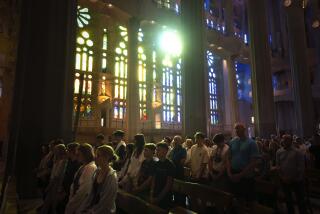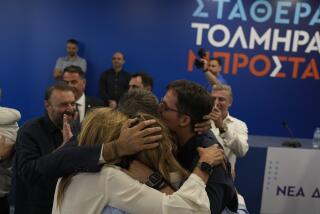As Greece’s government takes on Orthodox Church over mosque construction, minority Muslims stand to benefit
- Share via
Reporting from Athens — In a country where the Orthodox Church is part of Greek identity, Muslims have long found that new mosques could be built only in certain areas that did not include Athens, the capital.
But an influx of mostly Muslim migrants coupled with an unabashedly leftist Greek government is bringing change. Authorities in October signed a nearly $1-million (887,000 euro) deal to build the first state-funded mosque in Athens since the end of Ottoman rule more than 180 years ago.
The mosque planned for the Votanikos neighborhood, while significant, is expected to have a capacity of fewer than 500 people, not enough to meet all the needs of the estimated 200,000 Muslims in Athens, analysts and residents say.
“It would be a symbolic gesture,” said Konstantinos Tsitselikis, an expert on religious minorities at the University of Macedonia in Thessaloniki. “It’s very small and for sure cannot cover the number of Muslims in Athens.”
For decades, plans for a mosque have been stymied by vitriolic rhetoric against Muslims and Turks, the construction of a mosque likened to a return to Ottoman occupation. Police this month arrested 15 nationalist protesters who had occupied the site of the new mosque since July.
A proposal for a mosque near Athens International Airport failed in 2003 after the local Greek Orthodox bishop said it was “not representative of Greek culture” and foreign visitors would “feel they have arrived in a Muslim country.”
In 2014, a candidate for mayor from the New Democracy opposition party said a Votanikos mosque would attract unwanted foreigners.
But the government of Prime Minister Alexis Tsipras, which has proposed a constitutional referendum that would enshrine separation of church and state, has pushed ahead with the mosque plan.
“The existence of makeshift mosques is a shame for the country as well as for the Muslim community and a danger to national security,” Nikos Filis, the minister of education, research and religious affairs, said in August.
In recent weeks, Filis has also been criticized by church leaders for plans to update theology classes in public schools to include material on Islam and other religions in an effort to prepare students for the influx of Muslim migrants.
Politicians opposing the new mosque have said it would encourage the flow of illegal migrants, who they say make up most of the city’s Muslim population. Some church leaders, meanwhile, have couched opposition in religious terms.
The government’s outreach to Muslim migrants posed “a danger of Islamization” and was part of a plan to “de-Hellenize and de-Christianize” the nation, the head of the Orthodox Church of Greece, Ieronymos II, said this month in a televised interview.
Ieronymos, who is archbishop of Athens and all Greece, said that plans for the mosque in Votanikos should be postponed until it is clear how many migrants would remain in the city.
“If [Muslims] are passersby, what need is there” for a mosque? he said. “Will it be a place of prayer or a place of instruction? ... It is a problem.”
Other projects include the 17th century Fethiye Mosque, which is undergoing a $1.4-million (1.3 million euro) restoration by the government to house collections from four centuries of Ottoman rule in Athens. Turkish leaders have called for the mosque to be reopened for worshipers.
In the nearby 2,100-year-old Tower of the Winds monument, haphazardly painted Arabic calligraphy one could mistake for graffiti is found beside a prayer niche, drawn by whirling dervishes who used the structure as a lodge until the Greeks overthrew the Ottoman rulers in 1829.
Since then, the rights of the Muslim minority in Greece have been beholden to the prevailing winds of Turkish-Greek relations, Tsitselikis said.
“Religion and being Greek have long been linked together,” Tsitselikis said. “To be Greek, you have to be Greek Orthodox, and in some cases this is reflected in the law also. … Being Muslim is often linked to being Turkish.”
The Greek constitution stipulates Greek Orthodox Christianity is “the prevailing religion,” and 10,000 priests are on the public payroll.
Around 100,000 Muslims of Turkish descent in a handful of districts including Thessaloniki are granted rights to build and operate mosques under the 1923 Treaty of Lausanne, but those living outside the region, including Athens, have until recently had little legal recognition of their faith.
Under a 2006 law, minority faith groups no longer need permission from the local Orthodox bishop to build a place of worship, but problems remain.
Lack of funding and the fact that many of the Muslims in Athens are undocumented migrants make it difficult, if not impossible, for them to properly register a mosque, said Muhammad Abdulhamid, the chairman of a makeshift mosque in central Athens, who arrived in Athens 15 years ago from Pakistan.
The government streamlined the process for registering mosques in 2014, over heated debates in Parliament, denunciations by Orthodox clergy and protests by right wing groups like Golden Dawn.
So far only three congregations in the city have been able to register as places of worship. With little funds to hire the inspectors and lawyers to meet regulations, the 120 or so other congregations meet in sites registered as libraries, cultural centers, shops or apartments.
“We have lots of problems still,” Abdulhamid said. “We don’t have money because there are not people staying here permanently – with the economic crisis many people see Greece as a stopping point to Europe – and it’s difficult to find a space that meets the requirements for a mosque.”
Farooq is a special correspondent.
More to Read
Sign up for Essential California
The most important California stories and recommendations in your inbox every morning.
You may occasionally receive promotional content from the Los Angeles Times.










